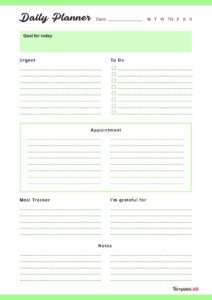Creating a Daily Routine For Your Loved One


When caring for someone with Alzheimer’s or dementia, one of the most important things you can do as a caregiver is to implement a daily routine, or daily structure.
A daily routine is important for many reasons:
– A daily routine that is followed by all caregivers creates consistency and familiarity for the individual with dementia.
– A daily routine helps to ensure better nutrition, rest, hydration, and overall physical well being.
– A daily routine can help reduce challenging behaviors, therefore reducing stress for both the individual with dementia and the caregiver.
What should be included in a daily routine?
1. Person centered preferences. A daily routine should first and foremost be created with the individual in mind. Historically, what time of day did the individual prefer to wake , go to bed, and have their meals? How did they prefer to spend their leisure time? What were their bathing routines? Before crafting the daily routine, discover the history of the individual.
2. Wake and rest times. Without being guided to a daily routine, someone with dementia can very quickly get their days and nights reversed – which can result in long and sleepless nights for the caregivers! A daily routine should include the time of day the individual wakes up, goes to bed, and takes a nap. A mid-day rest can be a wonderful thing, but 1-2 hours maximum.
3. Meal times and hydration. As the disease progresses, individuals with dementia often forget to eat – or that they have eaten. Structured mealtimes will ensure adequate nutrition. Hydration is also extremely important! Urinary tract infections can be a frequent culprit of challenging behaviors; having regularly scheduled times of hydration will lower chances of a UTI, and have numerous health benefits.
4. Exercise and movement. Exercise is a wonderful part of a daily routine! Exercise encourages rest, releases endorphins, promotes mobility and overall well being. Consider going for a walk, or doing chair aerobics, or even dancing. Movement can be fun!
5. Exercise for the brain. Did the individual enjoy reading the morning paper? Doing crossword puzzles or word searches? Instead of focusing on what they can no longer do, consider adapting activities to match their remaining abilities. Simplified large print word searches, or a fun game of finish the phrase can be wonderful tools!
6. Purposeful activities. Purpose is a need that we all have – dementia does not take that need away. Although it may be tempting to do everything for the individual, resist the urge. It as vitally important that the individual with dementia do as much as they can for as long as they can. Give the individual tasks to do throughout the day – folding towels, polishing silverware, drying dishes, shelving books – these are all things that can be safely done. It may not be done perfectly, but perfection is not the goal. The goal is that the individual feels needed and successful. Praise their work and thank them for their help. (Even if you have to re-do the task when they are not looking!)
7. Hobbies. What activities did the individual enjoy in earlier years? Nearly everything can be adapted in some way to the challenges of dementia. Music, art, baking, woodworking, gardening – these can all be incorporated into the day. Visit our page Activities for Dementia for ideas.
8. Social time. The world of someone with dementia can grow very small, very quickly. Resist the urge to isolate, and engage the power of community. Reach out to friends, family, clergy and encourage them to visit or call the individual at times of day when the individual is at their best. Go to a park and watch children/animals play, or a harbor and watch the waves. Although it may feel like extra work, it is good for the individual to get out – and you as the caregiver as well.
9. Restroom and personal care. A structured restroom schedule is a must for someone with dementia! Remind them/guide them to the restroom every 2 hours. This will reduce incontinent episodes and promote skin health. Have regular times of hand washing as well.
The benefits of a daily routine are tremendous for individuals with dementia and their caregivers. Download our free daily routine planning guide and template today!
